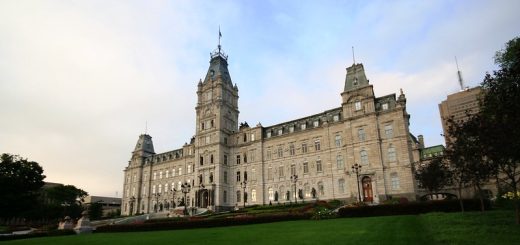State Surveillance Powers Made Available to Plaintiffs in a Class Action: Imperial Oil v Jacques
In a decision released on October 17, 2014, Imperial Oil v Jacques, 2014 SCC 66 [Imperial Oil v Jacques], a majority of the Supreme Court Court (“SCC”) upheld a Quebec motion court’s ruling that allowed plaintiffs in a class action to access relevant government surveillance materials during civil discovery proceedings. The class action arose after an investigation of gasoline price-fixing in Quebec led to criminal charges against numerous companies and individuals. Following the investigation, a group of plaintiffs represented by Simon Jacques launched a class action to recover the undue profits from Alimentation Couche-Tard and from Imperial Oil, operator of Esso gas stations.
To help make their case at the preliminary stages, the plaintiffs requested access to relevant wiretap evidence collected by the Competition Bureau of Canada (“Competition Bureau”) during its investigation of price fixing. The SCC’s decision affirmed the motion court’s order requiring the requested disclosure to be made. This decision is certain to embolden future plaintiffs but also to leave both defendants and investigators uncertain about the scope of required disclosure.
Facts
At the preliminary stage of class proceedings against Alimentation Couche-Tard and Imperial Oil, the plaintiffs requested disclosure of wiretap evidence concerning the defendants’ alleged price-fixing activities. This evidence consisted of thousands of private communications that had been intercepted by the Competition Bureau pursuant to judicial authorization and was later disclosed to the defendants during the course of the Competition Bureau’s investigation.
The plaintiffs made a motion to have a total of 5,175 intercepted communications disclosed by the Competition Bureau, and the defendants contested the motion.
By the time Quebec’s Superior Court ruled on the plaintiffs’ motion, many of the Competition Bureau’s intercepted communications had resulted in convictions and guilty pleas, but other intercepts remained subject to ongoing criminal proceedings in parallel to the class action.
The Rulings of Quebec’s Superior Court and Court of Appeal
Quebec’s Superior Court granted the Plaintiff’s motion and ordered the Competition Bureau to disclose its wiretap evidence accordingly: Jacques v Pétroles Irving Inc, 2012 QCCS 2954 [Jacques v Pétroles Irving Inc]. To limit any intrusions upon privacy interests resulting from this order, however, the Superior Court limited the disclosure “solely to the lawyers and experts who were participating in the civil proceedings” (Imperial Oil v Jacques, para 6). Further, the Superior Court’s order would not apply to any wiretaps involving communications between “third parties having nothing whatsoever to do with the proceedings” (para 6, citing Jacques v Pétroles Irving Inc, para 98).
Written by Justice Dominique Bélanger, who has since been appointed to Quebec’s Court of Appeal, the Superior Court’s judgment emphasized the need for balance between the protection of privacy and the court’s truth-seeking function. Justice Bélanger affirmed the Quebec Superior Court’s broad power to order third parties to disclose relevant information to civil proceedings, but she added that it remained open to defendants to object to the production of this evidence in court.
The Quebec Court of Appeal upheld the Superior Court’s decision, pointing to a lack of grounds to review the motion judge’s determination on the admissibility of evidence: Couche-Tard Inc v Jacques, 2012 QCCA 2266.
The Majority Ruling at the Supreme Court of Canada
The majority of the SCC upheld the decisions of the courts below, relying on the power of Quebec judges to compel disclosure in civil proceedings alongside exceptions to the protection of privacy set out in the Criminal Code, RSC 1985, c C-46.
The majority emphasized the broad powers established in article 402 of Quebec’s Code of Civil Procedure, CQLR c C-25, which enables courts to compel third-party disclosure of evidence deemed relevant in a civil proceeding. According to the SCC majority, Quebec courts “have great discretion” and will “generally favour disclosure” when exercising these powers (Imperial Oil v Jacques, para 28). As to limitations on the scope of this power, the majority did not outline specific scenarios but generally stated that disclosure would be limited where an opposing party or affected third party had established that the evidence was not relevant or that its disclosure constituted a significant breach of the third party’s privacy interests.
Concurring with Quebec’s Superior Court, the majority found that an appropriate balance had been struck by ordering third-party disclosure while limiting the scope of the disclosure to lawyers and experts involved with the litigation. The majority also agreed with the Superior Court’s finding that the lack of criminal charges against Imperial Oil was only one consideration for the court and not, as Imperial Oil had argued, a controlling factor in determining whether to order disclosure.
Responding to both defendants’ arguments that disclosure would constitute a criminal breach of privacy under section 193 of the Criminal Code, the majority pointed to exceptions under section 193 that permit for the disclosure of otherwise private communications to serve the truth-seeking function of courts in civil proceedings. The majority quoted Justice La Forest’s judgment in R v Duarte, [1990] 1 SCR 30 [Duarte], which held that the intention of Criminal Code provisions concerning privacy invasion was to strike “a reasonable balance between the right of individuals to be left alone and the right of the state to intrude on privacy in the furtherance of its responsibilities for law enforcement” (Duarte, 45). That is, while section 193(1) of the Criminal Code prohibits disclosure of intercepted private communications, section 193(2)(a) creates an exception where communications are disclosed for the purpose of giving evidence in a civil proceeding. The majority held that the disclosure at issue fit within the exception and therefore did not constitute a breach of either defendant’s privacy.
The Dissent at the Supreme Court of Canada
In her dissenting reasons, Justice Abella characterized the majority’s decision as enabling the plaintiffs to benefit from state surveillance powers without being subject to the same checks on that power to which the state is subject. Justice Abella emphasized that wiretaps made in criminal investigations must have their admissibility fully tested by associated criminal proceedings before being made available to members of the public. On this argument, ordering disclosure in Imperial v Jacques provided undue powers the plaintiffs by permitting them to benefit from extraordinary state powers without submitting to the rigorous testing of admissibility that would apply in any criminal trial prior to admitting similar wiretap evidence.
Conclusions
Although the majority’s decision in Imperial Oil v Jacques is grounded in Quebec’s statutory provisions concerning courts’ power to compel third-party disclosure, similar legislative provisions exist in other provinces. In Ontario, for example, a similar power is set out in the Rules of Civil Procedure, RRO 1990, Reg 194. The impact of Imperial Oil v Jacques therefore stands to be felt in litigation proceedings throughout Canada.
As the majority’s decision will likely embolden future plaintiffs to request disclosure of materials arising from state investigations, courts will face greater pressure to delimit and define the scope of the disclosure contemplated by the SCC in Imperial Oil v Jacques. As it stands, the majority’s decision leaves open a door through which plaintiffs may request a wide variety of surveillance and other information gathered by state actors in the course of a criminal investigation. Faced with such requests for disclosure, courts will need to decide how far their truth-seeking functions may extend into the products of such investigations without violating any salient privacy interests. For instance, would it ever be acceptable for a court to order the disclosure of the identity of whistleblowers or other sensitive third-party information?
In addressing such limits, future courts will need to grapple with policy issues that were not extensively addressed by the majority in Imperial Oil v Jacques, such as the potential chill over state actors’ ability to effectively undertake investigations where they may be required to disclose their findings to civil plaintiffs during the course of an investigation. If disclosure to plaintiffs comes at the expense of the state actors’ ability to carry out investigations in the first place, then neither group can benefit from the majority’s decision.







Join the conversation